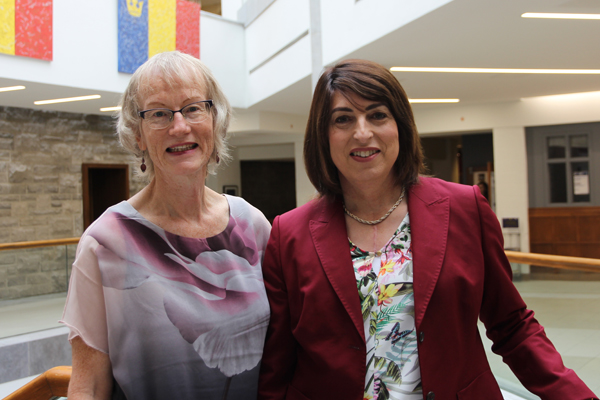Questioning the gender question
January 25, 2017
Share

The Policy on Collecting Information about Sex and Gender at Queen’s University, approved by Queen’s in September 2016, was developed to ensure that language used on intake forms, record documents, and surveys is inclusive and free from bias or barriers related to sex/gender identification. Under the policy, individuals creating and/or administering the above documents are responsible for consulting the Guidelines on Collecting Information about Sex/Gender at Queen’s University, which provide options and questions to consider when developing the documents.
M/F?
What is your gender?
What can seem like such a simple question is, in reality, not simple at all. That’s the message Ruth Wood and Erin LeBlanc, and others in the Queen’s trans community and the Equity and Human Rights Offices, want to spread through the Queen’s community and beyond.
“That’s the burning question. We stare at that box for a long time,” says Erin, who is transgender and works at Smith School of Business as director of strategic program development in the Office of the Dean.
“It is a very difficult question, especially if you are in transition phase,” echoes Ruth, who is also transgender and is a minister with the United Church of Canada who now works in the Office of the Chaplain, where she provides support specifically to the Queen’s LGBT+ community. “The question of sex or gender causes a lot of unnecessary stress for those who identify outside of the gender binary.”
Queen’s recently approved a new policy that suggests more inclusive ways to collect information about sex and gender. The policy advises anyone creating or administering intake forms, record documents, and surveys to consult a set of guidelines.
“The university strives to ensure that members of our community don’t encounter discrimination or harassment related to gender identity or gender expression,” says Irène Bujara, University Adviser on Equity and Human Rights. “This policy and the guidelines will help staff, faculty, and students develop inclusive and respectful information-gathering tools and processes.”
The guidelines encourage people to consider whether it is necessary to collect information concerning sex and gender in order to achieve their purpose and, if it is not, to not collect it. If information on sex or gender is required, the guidelines outline best practices to avoid misgendering people and for ensuring that the language used is inclusive and free from bias.
Raising awareness
“Having this policy will raise awareness and help those who design forms at the university. The question they are asking people to consider is a very important one, and will help people become more aware of the options available,” says Ruth.
“The policies are very comforting to us,” says Erin, who made her transition two years ago while working at Queen’s. “My transition was smooth and there were a lot of compassionate people who helped me and genuinely cared. But that is not the norm. Outside of Queen’s, most trans people have a much harder time, and face big challenges, including employment.”
Erin says it is very common to run into many administrative hurdles during transition, and even though she feels hers went well, she still encountered much ambiguity along the way.
“All through your life and transition, you are met with so many ‘I don’t knows.’ The procedures are not in place and people don’t know how to respond to all the questions – questions such as how to change your name on your staff card, and your Net ID, etc. It is death by a thousand cuts and it’s very damaging to the psyche,” she says.
Ruth, who helped develop the policy with the Equity and Human Rights Offices, says having the guidelines is especially important on campus. “Everything is compounded when you’re a student. Transitioning is already such a huge load, and particularly for students, it is important that we do not add to that load.”
Work in this area continues at Queen’s. Related to this policy and guidelines are practices surrounding preferred names and pronouns. Guiding work in this area is a desire to ensure that Queen’s University is an inclusive and welcoming community for all faculty, staff and students.